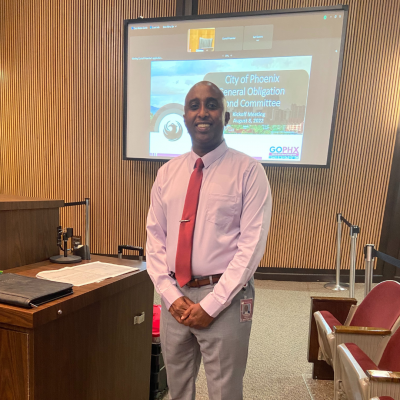Recently we caught up with UConn School of Public Policy (SPP) alum Yusuf Dirow on life after graduation. He updated us on his experience with the City of Phoenix, Arizona below!

I am happy to update my friends and mentors at SPP on my postgraduate endeavors. Back in June, I joined the City of Phoenix’s Management Intern Program (MIP) with the career goal of becoming a city manager. The MIP has been one of the nation’s oldest and most prestigious local government training programs since its inception in 1950. With over 200 alums succeeding in high-level leadership positions, the MIP provides endless networking and career resources. Graduates of this program are also considered quite lucrative in the world of local governments.
Perhaps the most fascinating aspect of my work is that I am given direct exposure to the policy issues that are relevant to the City of Phoenix. My role allows me to be a fly on the wall in many important meetings. I get to see how the executive team chooses which battle to fight and how to fight those battles. My core duties include providing staff assistance at City Council Meetings through minute-taking and summarizing key discussion points for the record. I am captivated by the process in which the executive leadership debates and prioritizes complex policy issues. I collaborate with department heads, the City Manager’s staff, the Mayor’s staff, and the City Council Members’ staff. Through these interactions, I gained a deeper understanding of the problems affecting Phoenix and a greater appreciation for the leaders trying to solve them.
The MIP offers three departmental rotations, each of which lasts about four months. My first rotation is in the Public Works Department, where I am given two projects to work on. The first project is a benchmark study on facilities rate models for the Facilities Services Division. For this study, I am collecting data and comparing facilities rate model designs used by cities comparable to Phoenix – in terms of population or form of government – for facilities operations. As part of this project, I am also developing a survey questionnaire to be sent out to department heads in those benchmark cities I mentioned, asking about their approach to facilities maintenance and repair cost recovery methods. The second project is with the Customer Engagement Services (CES) of the Solid Waste Division. I am tasked to review a Special Operation project called “Residential Roll-Offs” that handles Citywide dumpster requests. One of the things I am doing is identifying opportunities to streamline these processes and ensure the safe and efficient routing and delivery of these services. After finishing my Public Works rotation, I will spend time in the City Manager’s Office, where I will have a front-row seat to learn how all the puzzles fit together to make a large city function. I will attend key stakeholder meetings and respond to citizen inquiries. My final rotation will be at the Budget and Research Department (B&R), where I will refine my budget-making skills and learn how to do revenue estimations and long-range budget forecasts. As an inspiring public administrator, it would be hard to do any meaningful analysis without a reasonable understanding of how budget requests work. So, I hope to expand my knowledge of budget concepts and processes while in B&R.
Many of the skills I learned while completing my MPA are invaluable in my current position, most notably project management, survey research methodology, and memo writing. My Internship in Professional Practice at the Connecticut Department of Children and Families was also instrumental in launching my public service career. I learned how to compile and disseminate information, prioritize tasks, and, most importantly, how to adapt to a changing environment and collaborate with different personalities. I credit the MPA program to my success in beating out over a hundred candidates for the City of Phoenix Management Internship position.
The fiery ambition to become a city manager has not gone out. My experiences at the MIP only fuel this flame. I intend to take advantage of the City’s lateral growth opportunities by pursuing intermediate roles as stepping stones to becoming a city manager. I am immensely grateful for how far I have come, and I am excited for the future accomplishments I have yet to achieve. These dreams would never have come to fruition without the support of the following people: UConn School of Public Policy Director Dr. Mohamad Alkadry, Professor Jennifer Dineen, Professor Eric Brunner, and Professor Deneen Hatmaker. I also would like to thank Administrative Program Director Catherine Guarino, Administrative Coordinator Wade Gibbs, Operations Coordinator Maura Maloney, Social Media Coordinator Lian Kish, and Joel Wainwright, Professor of Geography and Political Economy at the Ohio State University.
You all positively influenced my career and professional development.
Thanks for all you do!
Kind regards,
Yusuf